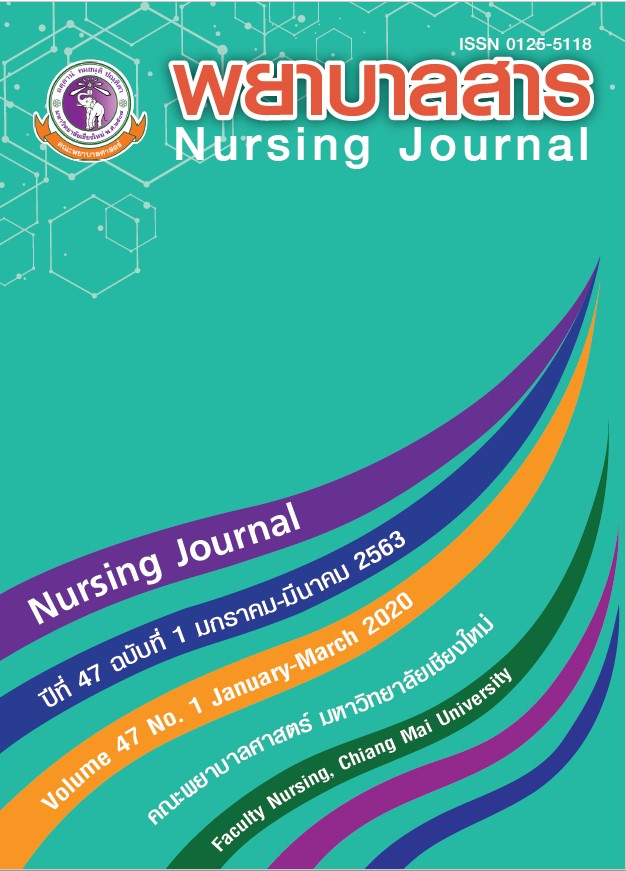Newborn Care Practices and Self-Efficacy among Bangladeshi Mothers
Keywords:
newborn care practices, self-efficacy, motherAbstract
The newborn care practice of mothers is a crucial issue for a newborn’s health status in order to reduce newborn morbidity and mortality. This descriptive correlational study aimed to examine the level of newborn care practices and self-efficacy, and the relationship between newborn care practices and self-efficacy among Bangladeshi mothers. The subjects were 105 mothers who provided newborn care at home and took their baby to receive vaccinations at an immunization center in Comilla Medical College Hospital when their baby was 6 - 8 weeks old. Data collection was carried out from May to June, 2015. The research instruments included the Newborn Care Practices of Mothers (NCPM) questionnaire and the Perceived Maternal Parenting Self-Efficacy (PMP S-E) tool, which were translated into Bangla by the researcher and were confirmed for validity by the experts. Their reliability coefficient was .87 and .81 respectively. Data were analyzed by using descriptive statistics and Spearman correlation coefficient.
The findings revealed that: all of sample showed newborn care practices at a moderate level (88.57%) with a mean score of 83.20 (SD = 6.55). Self-efficacy on newborn care score was at a moderate level (68.57%) with a mean score of 57.15 (SD = 5.88). Self-efficacy on newborn care had a statistically significant positive relationship with newborn care practices (r = .55, p <0.000).
The results of this study can be used by nurses in order to promote newborn care practices and self-efficacy regarding newborn care among Bangladeshi mothers.
References
Bandura, A. (1997). Self-Efficacy: The Exercise of Control. New York: Freeman and Co.
Barnes, C. R., & Adamson-Macedo, E. N. (2007). Perceived maternal parenting self-efficacy (PMP S-E) tool: Development and validation with mothers of hosp italized preterm neonates. Journal of advanced nursing, 60 (5), 550-560
Burns, N. & Grove, S.K. (2005). The practice of nursing research: Conduct, critique and utilization (5th ed.). Missouri: Elsevier Saunders.
Chaisom, P., Yenbut, J., Chontawan, R., Soivong, P., & Patumanond, J. (2010). Predicting factors of dependent care behaviors among mothers of toddlers with congeni tal heart disease.Chiang Mai University. Journal of Nursing Science, 9 (2), 193-200.
Chowdhury, S., Banu, L. A., Chowdhury, T. A., Rubayet, S., & Kh atoon, S. (2011). Achieving Millennium Development Goals 4 and 5 in Bangladesh. Journal of Obstetrics and Gynecology, 118 (2), 36-46.
Coleman, P. K., & Karraker, K. H. (1998). Self-efficacy and parenting quality: Findings and future applications. Developmental review, 18 (1), 47-85
Darmstadt, G. L., Syed, U., Patel, Z., & Kabir, N. (2006). Review of domiciliary newborn-care practices in Bangladesh. Journal of Health Population and Nutrition, 24(4), 380-393.
Government of the People’s Republic of Bangladesh. (2014). Health Bulletin. Dhaka: Management Information System, Directorate General of Health Services, Ministry of Health and Family Welfare.
Hashmi, S. I., Nawi, N. H. M., Seok, C. B., & Halik, M. H. (2014). “Am IA Super Mom”, Malaysian Working Mothers Believes About Their Parenting Self-Efficacy. In seminar kebangsaan integriti keluarga 2014. Organized by University Malaysia Sabah.
Hoque, M. M., Khan, M. F. H., Begum, J. A., Chowdhury, M. A., & Persson, L. A. (2011). Newborn Care Practices by the Mother/Care Givers and Their Knowledge ab out Signs of Sickness of Neonates. Bangladesh Journal of Child Health, 35 (3), 90-96
Jiji, D., Wankhede, R. S., & Benjamin, B. A. (2014). A descriptive study on newborn care among postpartum mothers inselected maternity centersin Madurai, Tamilnadu. International Journal of Allied Medical Sciences and Clinical Research, 2 (2), 119-124.
Marsh, D. R., Darmstadt, G. L., Moore, J., Daly, P., Oot, D., & Tinker, A. (2002). Advancing newborn
health and survival in developing countries: a conceptual framework. Journal of Perinatol-ogy, 22(7), 572-576.
Polit, D. F. & Beck, C. T. (2008). Nursing research: Generating and assessing evidence for nursing practice (8 th ed.). Philadelphia: Wolters Kluwer Health/Lippincott Williams & Wilkins.
Shorey, S., Chan, S. W., Chong, Y. S., & He, H. (2015). Predictors of maternal parental self-efficacy among primiparas in the early postnatal period. Western Journal of Nursing Research, 37 (12), 1604–1622.
Stifter, C. A., & Bono, M. A. (1998). The effect of infant colic on maternal self- perceptions and mother-infant attachment. Child: Care, Health and Development, 24 (5), 339-351.
Teti, D. M., & Gelfand, D. M. (1991). Behavioral competence among mothers of infants in the first year: The mediational role of maternal self-efficacy. Child development, 62 (5), 918-929.
The World Bank. (2016). Mortality rate, neonatal (per 1,000 live births) - Bangladesh. Retrieved from https://data.worldbank.org/indicator/SH.DYN.NMRT?locations =BD
World Health Organization [WHO]. (2015). Global health observatory(GHO) data. Retrieved from http://www. who.int/ gho/child.health/mortality/neonatal-infant text/en/
WHO. (2012). Newborns: reducing mortality. Retrieved from http://www.who.int/mediacentre/factsheets/fs333/en/
Downloads
Published
How to Cite
Issue
Section
License
บทความที่ได้รับการตีพิมพ์เป็นลิขสิทธิ์ของวารสารพยาบาลสาร
ข้อความที่ปรากฏในบทความแต่ละเรื่องในวารสารวิชาการเล่มนี้เป็นความคิดเห็นส่วนตัวของผู้เขียนแต่ละท่านไม่เกี่ยวข้องกับมหาวิทยาลัยเชียงใหม่ และคณาจารย์ท่านอื่นๆในมหาวิทยาลัยฯ แต่อย่างใด ความรับผิดชอบองค์ประกอบทั้งหมดของบทความแต่ละเรื่องเป็นของผู้เขียนแต่ละท่าน หากมีความผิดพลาดใด ๆ ผู้เขียนแต่ละท่านจะรับผิดชอบบทความของตนเองแต่ผู้เดียว






